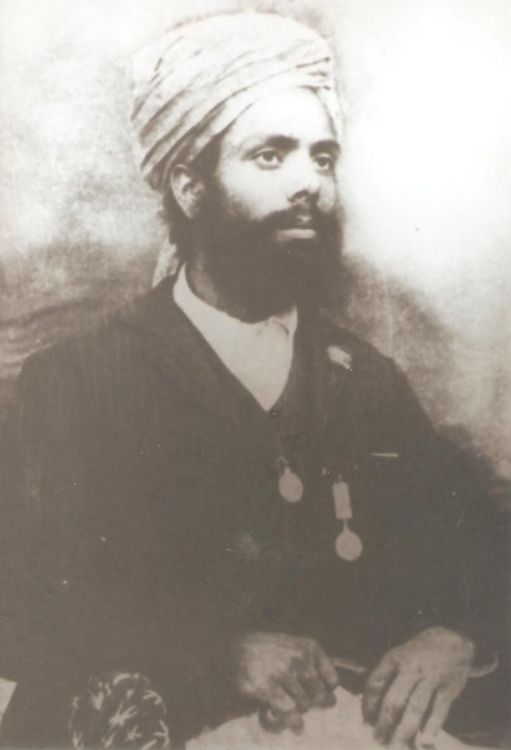For smooth Ad free experience
For smooth Ad free experience
Have you ever heard someone say “I’ll die in peace if this happens in my lifetime.”? Some get their last wish fulfilled, some don’t. Is it about how passionately you want it? This man who spent most of his life fighting for India’s independence breathed his last the same night India was born. His wish was granted.

Passed away on 15th August 1947
Sardar Ajit Singh is one of those men whose names and contributions have been forgotten in India’s freedom struggle. A revolutionary and dissident, Ajit Singh, fought against imperial injustice and spent 38 long years in exile after being charged for sedition.
Ajit Singh, Bhagat Singh’s uncle is fondly remembered as ‘Chacha’ in the regions of Punjab and Haryana. Azaadi ran through their blood.
Ajit Singh was instrumental in instilling nationalist sentiments among the people of Punjab through his leadership in the ‘Pagdi Sambhal Jatta’ Movement alongside Lala Lajpat Rai, Kishan Singh (Bhagat Singh’s father) and Sufi Amba Prasad.
They organised a peasants’ rally on 3 March 1907 in Lyallpur (present day Faisalabad in Pakistan) to protest against the three British laws - The Doab Bari Act, Punjab Land Colonisation Act, and the Punjab Land Alienation Act. These laws predominantly focused on snatching away the autonomy enjoyed by peasants of Punjab (also includes parts of present day Pakistan, Haryana and western Uttar Pradesh ).
In 1879, the British constructed an Upper Bari Doab Canal from the Chenab river to Lyallpur, which was previously an uninhabited area and promised the allotment of free land to the peasants. The peasants moved and settled in these new lands but were denied ownership rights and were reduced to the status of sharecroppers. The British could then exercise their might unchallenged and exploited the peasants for extravagant revenue demands and agri-taxes as well as prohibited the farmers to build houses or fell trees on these lands.
Additionally, the law of primogeniture was imposed, according to which, the land would only be inherited by the eldest adult son; if he in any circumstance died before attaining adulthood, the land would be confiscated by the Government.
It was here that Banke Dayal, sang his poetry “Pagdi Sambhal Jatta” , which came to be recognized with the movement itself. ‘Pagdi’, or turban is a reference to one’s dignity which was being attacked by unjustified laws inflicted by the British.
A verse from the Dayal’s poem-
*“Seene vich khaaven teer. (Bear arrows in the chest)
Raanjha toon desh e heer. (Ranjha (boy’s name), you are the country’s diamond (pride))
Sambhal ke chal oe veer. (Walk carefully, you brave man)
Raste vich khaal o. (They (British) are obstructions in your path)
Pagri sambhaal o jatta” (Save your turban(dignity))*
Sardar Ajit Singh’s ideas on farmer’s upliftment remain relevant even today and continue to resonate with farmers of the present generation.
Echoes of solidarity were heard when attempts to revive the ‘Pagdi Sambhal’ Movement reverberated through the Farmer’s protest of 2020-21. The farmers displayed a united front donning their regional turbans on 23rd February, Chacha Ajit Singh’s birth anniversary, which they proposed to be commemorated as ‘Pagdi Sambhal Diwas’ every year.
Ajit Singh’s life was mostly spent in exile. He travelled from country to country, disguising himself, and creating a global network against Imperial rule. He lived in Shiraz, Iran as Mirza Hasan Khan disguised as a teacher. From Iran he went to Paris where he built a network of solidarity with people who were fighting for the cause of India’s independence in different parts of Europe. It was here that he founded the Indian Revolutionary Association (Bharatiya Krantikari Sangh) and laid the foundations of Azad Hind Lashkar, an army of 11,000 men.
Italy was defeated in May 1945 in World War II, and Ajit Singh was amongst the ones arrested by the allied forces. He was incarcerated in jails across Italy and Germany for a year and a half. On popular demand, Nehru pushed for Ajit’s release as India was on the verge of independence in 1946.
During his globetrotting experiences, he met with Lenin, Trotsky, and Mussolini and travelled to several countries including Switzerland, Turkey, Russia, Germany, Brazil, The Arab, Finland, Ireland, and many more places meeting people and spreading the cause of freedom before he decided to return to his homeland. On 7 July 1947, Chacha Ajit was back in the cradle of his motherland amidst deteriorating health.
On 15th August, at the stroke of midnight hour, when the world slept, and India awoke to life and freedom, a man who had given his life for the cause slept in peace for ever. He passed away at around 3:30 am at the dawn of India’s independence.
0
You might be interested in reading more from
